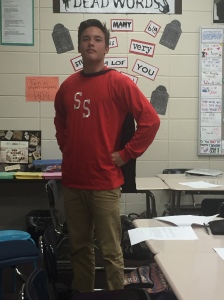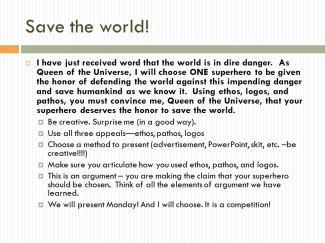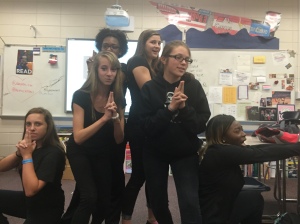 I believe in giving students mentor text. I believe in modeling skills. I believe in setting goals and using progression charts. I sometimes do not believe in the effectiveness of rubrics.
I believe in giving students mentor text. I believe in modeling skills. I believe in setting goals and using progression charts. I sometimes do not believe in the effectiveness of rubrics.
Don’t get me wrong—there is a time and place for rubrics. I use them for some assignments. But I’ve also seen where rubrics have crippled creativity and making in a classroom.
Unless the rubric is crafted well, it can often be read as the least you need to do to get a certain grade. I don’t want my students thinking in those terms. So for some assignments, I set out my expectations in a different way. In a way that allows students to know what they need to do without putting them (and myself) in the “least you have to do” box.
For example, recently we studied logos, pathos, and ethos, and their use in argument. I wanted to know if students understood logos, pathos, and ethos, and I wanted to know if they could use each effectively in an argument. There were lots of ways this could have been done, but, for fun, I created a scenario about the world ending (see below), and they had to take on the persona of a superhero and argue for the honor saving the world. In their arguments, they had to effectively use pathos, logos, and ethos , as well as some of the other elements of argument we had learned.
, as well as some of the other elements of argument we had learned.
I could have created a rubric for this assignment, but instead I asked the students to be very convincing and surprise me in a good way. We have built a culture of high expectations in my classroom. Students know that I expect quality work. But how do you put creativity or leadership or collaboration or curiosity or self-efficacy or so many of those other skills that are hard to quantify on a rubric? How do you put going above and beyond on a rubric?
So I didn’t make a rubric. It wasn’t a major grade in the grade book. I just wanted the students to have fun and show me what they learned (the quantifiable stuff) in a way that worked for them.
When they presented their work. I was amazed. I would have never even thought to ask them to do the things they did in the ways they did it. They did surprise me in a good way, because they had the freedom to do so. Here’s one example: Superhero News Cast
good way, because they had the freedom to do so. Here’s one example: Superhero News Cast
I’m not saying do away with rubrics for everything, but I am saying maybe we should consider the boxes rubrics can create.
Bonus Read:
Sometimes I get frustrated just when I hear the word differentiation. It’s not because I don’t value it, use it, or believe in it. It’s just become one of those educational words that is overused and often not used correctly. It was refreshing to read Pernille Ripp’s An Easy Yet Powerful Method for Differentiating Instruction. Even more than that, I felt challenged to allow my students to make differentiation choices for themselves. And perhaps best of all, it is something that I can use immediately in my classroom.
